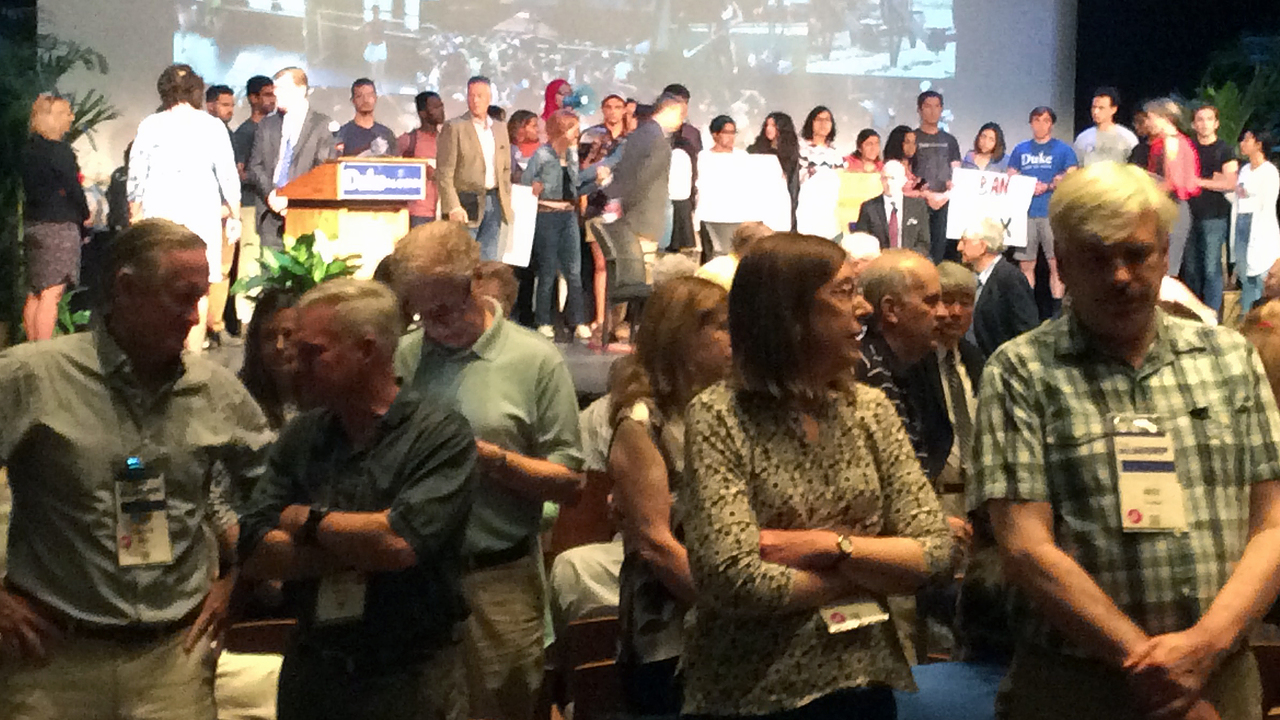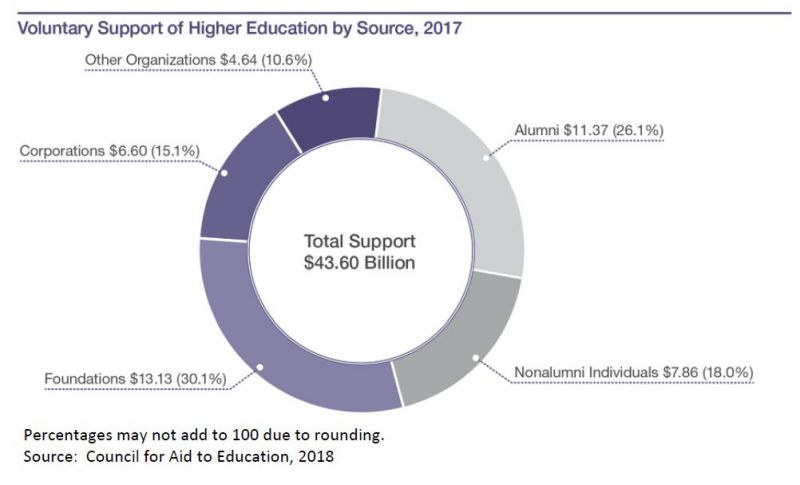
In an attempt to pressure and embarrass Duke University’s President Vincent Price, an undergraduate student group, known as the “People’s State of the University,” interrupted the President’s speech during an alumni weekend event and delivered 12 demands for institutional change.
The protestors’ demands ranged from a $15 an hour minimum salary for all hourly Duke employees; to the hiring of at least one black Africanist for the African American Studies Department; one black faculty in the Nicholas School for the Environment; at least one indigenous faculty member; two Latinx faculty; and at least one trans-feminine identifying faculty member.
Students are also demanding that Duke “ban the box” by “eliminating the unjust hiring practice” of requiring applicants for work on the Duke campus disclose their criminal-legal histories.
It is not a coincidence that the student protestors chose to disrupt a Duke alumni event. Alumni are the largest private source of financial support for higher education and Duke alumni are among the most generous in the country. Duke set a record in 2015-16 when alumni gave $571 million in gifts and pledges to the University. They also received $37.5 million to Duke Annual Fund, which supports the faculty.
In fact, the “People’s State” protestors rushed the stage at the exact moment that President Price was to accept the annual class gifts from the alumni. Chanting “President Price get off the stage…Whose University? Our University,” the group succeeded in silencing the president and shouting their demands.
According to the Duke Chronicle, the University’s independent student newspaper, the alumni responded negatively to the protestors—with some standing up to turn their backs to the stage. After ten minutes, the associate vice president for alumni affairs announced that the talk would be canceled, but the protestors decamped to the chapel where the disruption continued.
Protesters later received emails informing them that the Office of Student Conduct had opened up inquiries into the alumni disruption. Once President Price met with the protest organizers, and more than 100 of the Duke faculty signed a letter to the administration urging them not to punish the students who protested, the student conduct investigations into the activists’ actions were halted. Duke History Professor William Chafe told a reporter for the Duke Tar Heel that “It’s much more important to talk than to punish.”
The Duke protestors have declared victory claiming that they are “celebrating this win and are excited to hear that the administration chose the correct action…our coalition has since almost quadrupled in size now…We’re meeting tonight to chart long-term strategy and see how this energy is sustained.”
But, what about the alumni who made those generous class gifts? What about the alumni who may not agree with all of the protestors’ demands? None of the campus newspapers seemed interested in interviewing them. But the Duke Chronicle published an open letter from some recent grads who wrote to support the protestors and demand that Duke update the protest policies to “allow for future student activism without disciplinary review or penalty.” Nearly all of the signatures to the Open Letter are recent graduates.
Responding to alumni concerns is becoming a growing challenge for University administrators. As stakeholders in higher education, alumni want some kind of reassurance that their alma mater will not misuse or squander the contributions of time, talent and treasure they have contributed. Most alumni—especially alumni of religious colleges and universities—are especially concerned that their alma mater is fulfilling the mission of the founders. It inevitably leads to concern with conserving the true mission of the university, forming something that sociologist Robert Bellah and his co-authors of Habits of the Heart have called a “community of memory.” Most alumni want to maintain the mission of the university they have remained loyal to.
However, there are a growing number of faithful Christian and Catholic universities under attack from alumni who want these institutions to change with the changing culture. No longer a “community of memory,” a small number of disgruntled former students at Christendom College and Franciscan University of Steubenville have mobilized to claim that the faithful Catholic teachings on modesty and chastity on these campuses are actually “causing” sexual assault. They are now demanding that the schools revamp their Title IX policies and procedures to emphasize “consent” rather than chastity.
In an article entitled: “Do Rules Cause Rape?”, Austin Ruse, a well-known conservative Catholic, argues that a large part of the motivation for the recent attacks on Franciscan University of Steubenville and Christendom College has been an “intense dislike of anything that smacks of theological or political conservatism.” For evidence, Ruse points to an article that is critical of Christendom which suggests that the college’s “sheltered, highly structured campus culture actually facilitates sexual assault.”
This is not the first time that Franciscan has endured the barbs of alumni demanding institutional change. In 2012, two graduates–both members of the Franciscan Gay Alumni and Allies Facebook group—issued a press release complaining about a description for a Social Work course which listed homosexuality as a form of deviant behavior.
The group demanded that the university revise its course description to “stop contributing to the culture of hate and ignorance.” The alumni also encouraged other Gay Alumni Facebook group members to contact the social work accrediting agency to investigate the matter and to contact and complain to the university administration. It was an obvious attempt to damage the accreditation of the university.
In an interview on National Public Radio, Stephen Holloway, the director of the office of accreditation at the Council on Social Work Education said that the Franciscan alumni concerns “raised a flag” for them regarding social justice for the GLBTQ community. Holloway should know that for a faithfully Catholic college like Franciscan, there is a challenge in defining social justice for GLBTQ individuals.
For those outside the Church, social justice may demand access to marriage for same-sex couples. But for faithful Catholics, social justice demands that the teachings of the Church be followed: treating the GLBTQ individual with “respect, compassion and sensitivity” while at the same time maintaining the sacredness of marriage as between one man and one woman.
Some of the same angry alumni involved in the 2012 Franciscan Gay Alumni and Allies Facebook group attack on Franciscan University are now leading the criticisms of the policies surrounding Title IX on the University campus today.
Moody Bible Institute is faced with a similar challenge to its historic mission through a lawsuit filed by Janay Garrick, a former Communications instructor who claims that she was fired because she advocated for gender equity. On her blog the former Moody Bible Institute instructor writes: “On paper, my egalitarian position was the official reason given for my termination, but the real reason, the one Moody wants to keep silence is this: I helped a female student file a Title IX gender discrimination complaint against the school in 2016.” The former student was challenging the male-students-only Pastoral Ministry major.
Not surprisingly, Garrick has cited support from female alumni who she claims have told her “the most heartbreaking stories of what it was like to be a female student at Moody Bible Institute.” Rejecting the Christian notion of complementarianism, Garrick notes that “Moody’s problem is the campus is heavily saturated in sexism and misogyny that not a single person who hears the sexist remark is even remotely phased by it.” Similar charges are made about the male-only priesthood—a central doctrine of the Catholic Church—by feminist alumni of faithful Catholic colleges and universities.
Activist alumni are increasingly using their voices to lobby their alma maters on issues of gender equity and against what they see as institutional injustices. Their goal to be “change agents” is often noble, but their demands may not be shared by other alumni, current students, faculty members and staff.
In fact, sometimes, their demands seem to include one that Catholic colleges stop being Catholic.

Don’t contribute if you disapprove.
Ever since the Supreme Court found for gay marriage, there has been this vindictive triumphalism in the LGBTQ community. There is an arrogance, an egregious overreach, to it. They never sleep, they never stop, they never quit. And they hate Christians.
Thank you, Anne, for this timely and truthful article. I wish I could support you more openly, but I fear the persecution of orthodox faculty at Franciscan is really just beginning. It is going to get a lot worse.